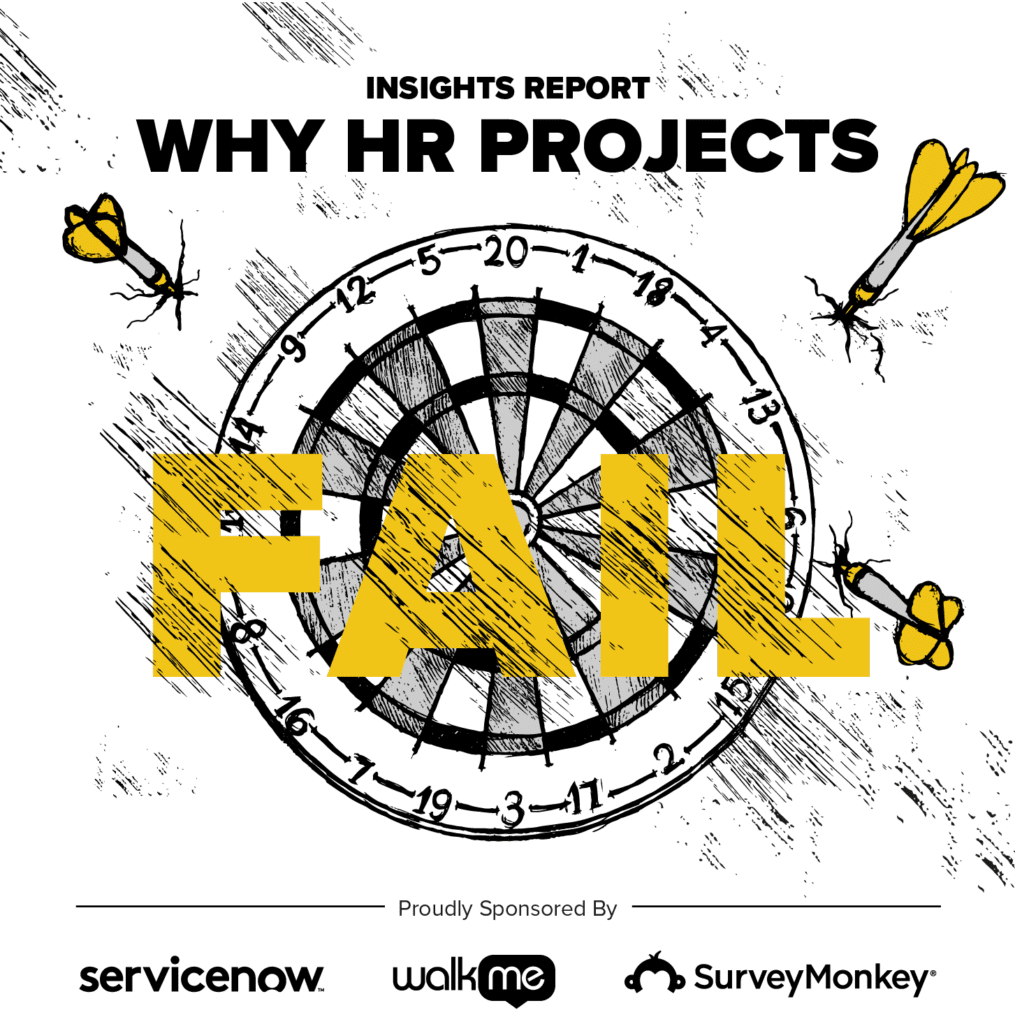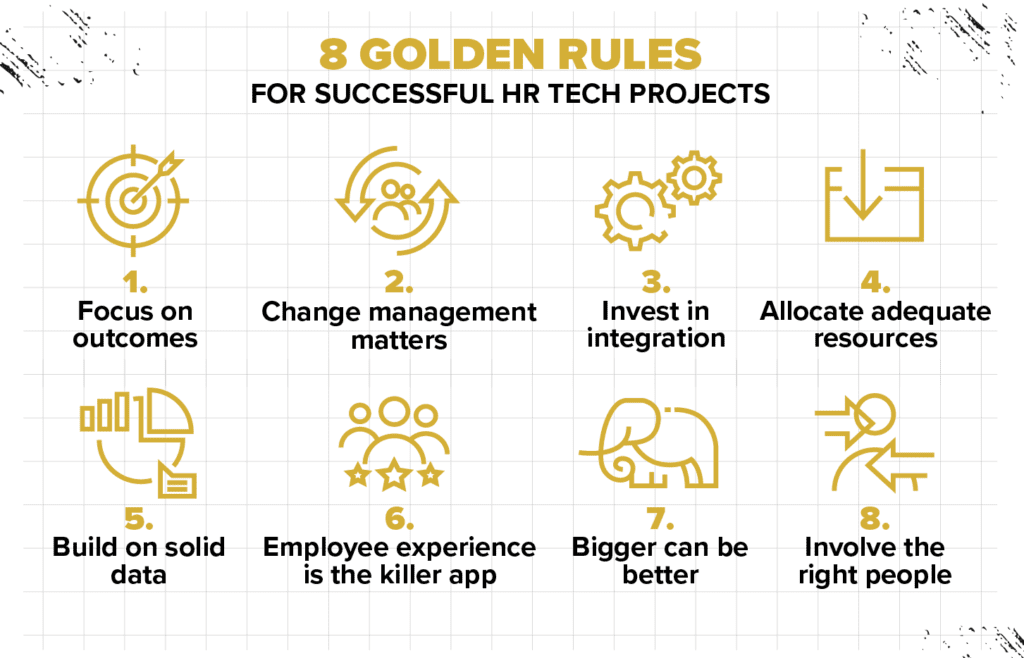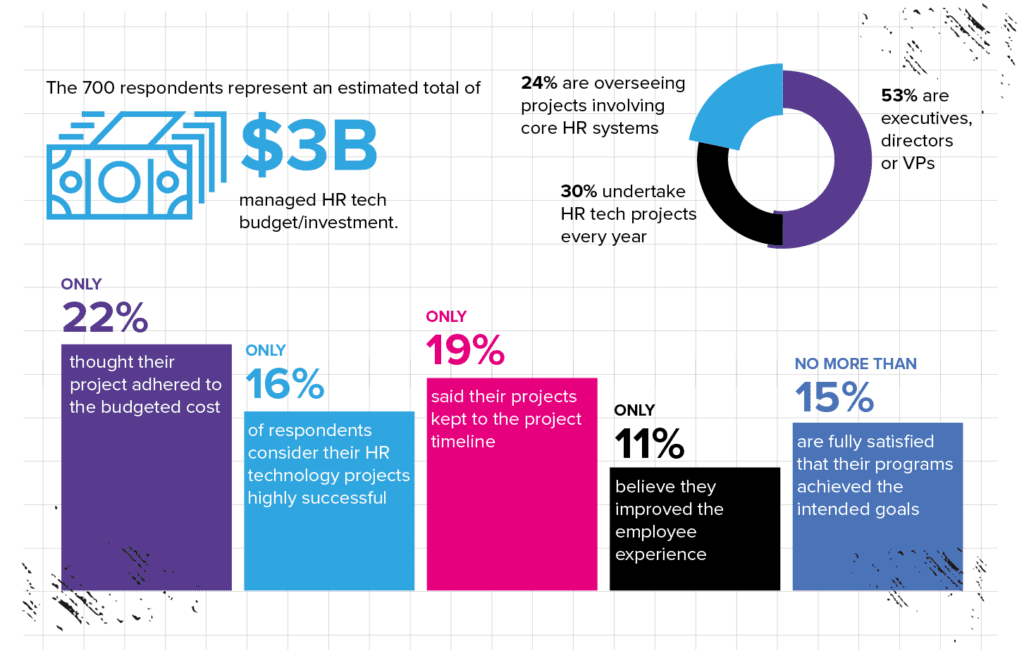WHY HR PROJECTS FAIL: 2021’S NEW GOLDEN RULE
Exclusive new insights from ServiceNow’s Gretchen Alarcon.
Why You Should Care
46% of respondents cited three or more problems impacting project success.
19% of respondents were too focused on technology rather than the outcomes.
46% HR tech projects over-ran.
84% claimed their recent HR projects were unsuccessful.
Our ground-breaking Why HR Projects Fail report brought together nearly 1000 global HR leaders for a deep dive study into what was working and what wasn’t.
Now, together with our key partners in the report, we’re releasing brand new insights.
Since we launched the results of our research — which found that only 16% of HR leaders claimed their HR projects were a success — they have one of the most talked-about topics in the HR world.
From the data findings, the report included our 8 Golden Rules for success which helped provide a winning framework for HR leaders looking to conduct new projects.
ServiceNow which partnered with us on the report are now offering UNLEASH users an exclusive 9th Golden Rule based on their experience of the past 12 months.

Gretchen Alarcon, vice president and general manager of HR Service Delivery at ServiceNow reviewed the report and revealed:
“This report raised so many HR efficiency questions – but the bigger issue is, you’re not meeting your objective if only 16% are actually meeting their goals. That’s a failure.”
ServiceNow is a cloud-based platform company that delivers digital workflows and unlocks productivity for employees and the enterprise. Alarcon brings more than 20 years of experience in product strategy and worked at Oracle for more than 15 years before she joined ServiceNow.
Alarcon’s 9th Golden Rule is summarized as:
9. Champion your culture and values
“Your HR project needs to work under the values and mantra of the business goals as a whole. When HR leads a new project, it is a cultural statement. When you’re partnering with others, involving the right people from other teams, and thinking about the employee experience at a human level, your mantra needs to be the same. Because every time an employee touches a system and at any point in the process, they are having a brand experience.
“And so we need to kind of think about it that way in terms of, you know, what does it say about your culture? What does it say about what you value? You know, do you have to dig through 50 rounds of policy before you can get to a transaction? That might be what HR thinks employees need, but you know what, I’d be willing to bet employees will get through that first page of results and then stop because they are either frustrated, or they pick up the phone because they’re like, I need a human and I can’t figure out how to do this.
“With any project a lot of the time you will involving teams externally too. When partnering with individuals and teams outside the organization you also need to have the same experiential mantra and that will help you with your success.”

RETHINK YOUR IMPACT
Also critiquing the findings in the report, Alarcon noted:
“The points highlighted in the report are consistent with what we’re seeing as well.
Every customer I speak to says you can’t underestimate change management.
Integration is critical because HR has so many platforms. And employee experience is so often the thing that gets lost in all the HR tech in so many cases. But that’s when the implementation gets going and it comes back to being in the business of HR. People forget that they are designing a project for someone who is not an HR user or that the ultimate consumer is not an HR professional.”

“And I think where a lot of programs get bogged down is so much time is spent on redesigning the performance management process or, you know, let’s rethink how we are going to do compensation, for example. But as we’re doing this full implementation we need to also rethink all these HR processes.
“Because they don’t necessarily think about the impact on the employee is, the employee who perhaps only looks at Performance Management once a year, but they have to right now because it’s actually a value to them. So they’re, they’re not thinking about how it really works and impacts their audience.”
EMPLOYEE EXPERIENCE
Also on the topic of data, Alarcon commented that championing your culture and employee experience will help with an HR project’s success.
She said: “So I think one of the things we need to be really clear on is that most of the transformations and implementations that you’ve heard about over the last 10 years have really been focused on data and transactions.
“For example, what are the steps? How do I get my data? That that is what the move to the cloud was for HCM systems for quite some time.
“Where there is real opportunity is people talking about this in terms of what is the employee actually trying to accomplish? And how do you make the HR services more relevant to an employee?
“When I think about, you know, my experience using HR, it kind of comes into two processes.
“The first is, I need to know something urgently for a meeting within the next five minutes. And I’ve only allocated five minutes to figure this out. The user will want to know the answer to the question right now question and shouldn’t have to work really hard on finding it.
“Then there’s a much larger complex problem that I don’t know where to start, so I probably need to talk to a human. And unfortunately, when we think about the employee experience, a lot of times we just say, the employee experience, we don’t really start to differentiate around what is the employee trying to accomplish?
“And therefore, what are the different tools that the employee needs to access to? That’s where closely defining your goal and the values around the experience they are having meeting that goal comes into play.”

Sign up to the UNLEASH Newsletter
Get the Editor’s picks of the week delivered straight to your inbox!

Head of Special Projects at UNLEASH
Jennifer Dunkerley is an award-winning editor and senior digital content manager.
